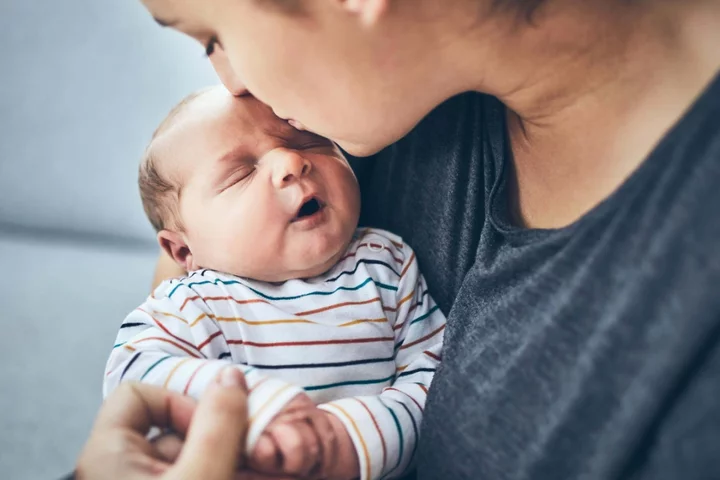
Action needed to protect women from birth trauma – MP
More must be done to protect women from birth trauma, a Tory MP has said after a new poll revealed that traumatic births have prevented a significant proportion of women from having more children. Theo Clarke said that it was “vitally important” that women receive the care and support they need after a traumatic birth. It comes after a poll of members of the Mumsnet community found that more than half (53%) who had suffered birth trauma said their experience put them off having more babies. The MP for Stafford has previously spoken out about her own birth story, where she described how she thought she was “going to die” after suffering a third degree tear and needing emergency surgery. She has since set up an All Party Parliamentary Group (APPG) on Birth Trauma to try to highlight the plight of thousands of women who suffer similar situations each year. A poll of 1,000 members of the Mumsnet website, shared with the PA news agency, found that 79% of those surveyed had experienced birth trauma. While the poll does not represent all mothers across the UK, it provides a snapshot of the experiences of those who use the popular parenting site. The survey also found that 72% of those who had experienced birth trauma said their issue had not been resolved a year after giving birth. Among those who had experienced physical, emotional or psychological birth trauma, 44% said healthcare professionals used language which implied they were “a failure or to blame” for the experience. Three quarters (76%) of all of those polled said they felt that health professionals had become “desensitised” to birth trauma. Almost two thirds (63%) said they did not believe healthcare workers did everything they could to prevent birth trauma. And 64% said they felt a “lack of compassion” from healthcare professionals during labour. Commenting on the poll, Ms Clarke said: “These survey results are deeply upsetting. They speak to my own experience of birth trauma and quite clearly to many, many other women’s horrendous experiences too. “That more than half of women across the UK who responded say they are less likely to want another child because of their birth experiences and they were made to feel they were to blame is simply terrible. “The survey is clear that more compassion, education and better after-care for mothers who suffer birth trauma are desperately needed if we are to see an improvement in mums’ physical wellbeing and mental health. “The APPG is now up and running in Parliament and will continue to listen to mothers and experts to drive fundamental change in how we treat mums. Our ambition is for birth trauma to be included in the Government’s women’s health strategy. “It is vitally important women receive the help and support they deserve.” Mumsnet chief executive Justine Roberts said: “We hear daily on Mumsnet from women who have had deeply upsetting experiences of maternity care, and this latest research underlines that the majority of mothers experience birth trauma – whether physical or psychological. “This trauma has long-lasting effects and it’s clear that women are being failed at every stage of the maternity care process – with too little information provided beforehand, a lack of compassion from staff during birth, and substandard postnatal care for mothers’ physical and mental health.” Kim Thomas, chief executive of the Birth Trauma Association, added: “It is time for a complete overhaul in the way women experience maternity. “This should include: honest, evidence-based antenatal education; compassionate and professional care during labour; and postnatal care that is designed to identify and treat every birth injury or mental health problem. “A maternity system that puts women at the heart of care is not some kind of unfeasibly high goal – it is the bare minimum that women have the right to expect.” A Department of Health and Social Care spokesperson said: “We are committed to making the NHS the safest place in the world to give birth, and improving support for women before, during and after pregnancy is a priority in the Women’s Health Strategy. “We are investing an additional £165 million per year to grow and support the maternity workforce and improve neonatal care. NHS England recently published a three-year plan to make maternity and neonatal care safer, more personalised, and more equitable for women, babies, and families. “To support women following trauma related to their maternity experience, we are rolling out 33 new maternal mental health services, which will be available across England by March 2024.” Read More Charity boss speaks out over ‘traumatic’ encounter with royal aide Ukraine war’s heaviest fight rages in east - follow live Imagination and hard work in children trumps obedience – research finds 7 ways you could be damaging your eye health without even realising Celebrities mingle with royals at glam Vogue World party in London
2023-09-15 16:30
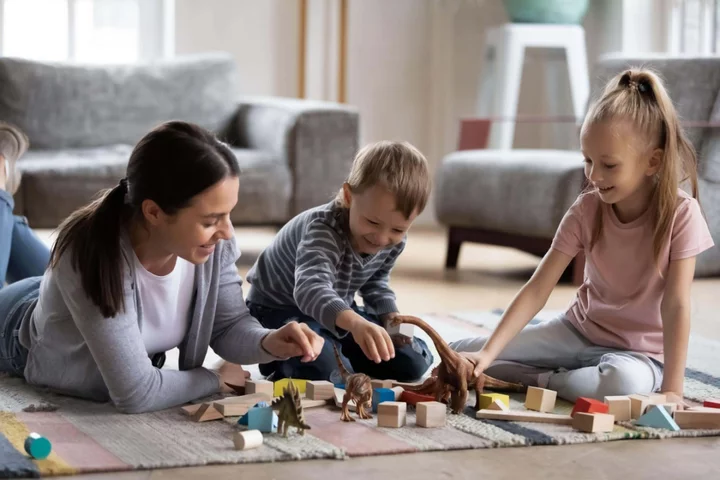
Imagination and hard work in children trumps obedience – research finds
Imagination trumps obedience when it comes to what the public thinks are important qualities in children, according to new research. But while British attitudes have changed in the past three decades, children being taught good manners at home is still highly rated among the majority of people, the wide-ranging survey found. Some 85% of people in 2022 saw good manners as especially important for children, down only slightly on the 89% who said so in 1990, research by the Policy Institute at King’s College London (KCL) showed. Good manners are still the quality we want to see most, there has been an increasing emphasis on the importance of hard work, and we’re also among the very most likely to value unselfishness Professor Bobby Duffy Obedience is now far less valued, the analysis of the long-running World Values Survey (WVS) found, with just 11% of those asked last year citing it as being an especially important quality for children to be taught, down from a peak of 50% who felt that way in 1998. More people now think qualities including independence and hard work are important things for a child to be taught, with the former up to 53% last year from 43% in 1990, and the latter having risen from 29% to 48%. Around four in 10 (41%) people said determination and perseverance were important, up from 31% three decades earlier, while more than a third (37%) felt imagination was important, up from less than a fifth (18%) in 1990. Tolerance and respect for others are still among the qualities seen as very important, coming just behind good manners at the top of the list, but it is now seen as less important that a child is taught to be unselfish, the research found. More than half (56%) of people thought it was especially important for a child to be taught not to be selfish back in 1990, but that fell to 43% last year. Of the 24 countries surveyed, the UK is among the most likely to value unselfishness in children and among the least likely to value responsibility and obedience, researchers said. More people in Japan, Norway, Sweden and South Korea felt imagination was very important for children to have, while only five countries (Egypt, Philippines, Morocco, Nigeria and Mexico) were above the UK in valuing good manners in children. Professor Bobby Duffy, director of the Policy Institute at KCL, said: “The qualities we’d like to see instilled in our children are important signals of what we value as a society – and the very clear message from these long-term trends is the increased importance of imagination and decline in how much we prize straightforward obedience. “But this doesn’t mean we want a society of self-centred children – good manners are still the quality we want to see most, there has been an increasing emphasis on the importance of hard work, and we’re also among the very most likely to value unselfishness. “Instead, this is likely to reflect a more general shift towards valuing self-expression, while still wanting our children to be positive and productive contributors to society.” The 2022 data comes from a sample of 3,056 adults across the UK interviewed by Ipsos through a mix on face-to-face and online survey methods, but for the analysis of trends over time, data is nationally representative for Great Britain only due to a lack of available trend data from Northern Ireland, and is based on surveys of 1,000 or more adults. Read More Charity boss speaks out over ‘traumatic’ encounter with royal aide Ukraine war’s heaviest fight rages in east - follow live 7 ways you could be damaging your eye health without even realising Celebrities mingle with royals at glam Vogue World party in London Sienna Miller bares baby bump at celebrity and royal-studded Vogue event
2023-09-15 15:53

7 ways you could be damaging your eye health without even realising
Our eyesight is often something we take for granted – until there’s something wrong with it. Problems like short-sightedness (myopia) are rapidly increasing. In fact, research has predicted that by 2050 there will be 4,758 million people with the condition – nearly half (49.8%) of the world’s population – as experts are highlighting ahead of National Eye Health Week (September 18-24) In addition, new research by Macushield found 73% of Brits notice their eyes deteriorating with age, and the World Health Organisation’s (WHO) World Report on Vision has predicted a dramatic increase in the need for eyecare in the near future, pointing out that at least 2.2 billion people globally have a vision impairment – and around half of these have vision impairment that could have been prevented. “Some people may not be giving their eye health the attention it deserves, occasionally missing out on annual eye tests, which play a crucial role in detecting conditions like cataracts, glaucoma, and age-related macular degeneration,” says ophthalmologist Dr Jørn Slot Jørgensen. “When identified and addressed in a timely manner, these issues can be managed effectively, helping safeguard our vision.” Jørgensen says the pandemic also played a role in worsening eye problems, particularly the increase in short-sightedness. “With the shift to remote work, people are now more likely to spend extended hours with their screens for work and leisure,” he says. “Prioritising eye health isn’t just a matter of convenience, it’s a fundamental aspect of our overall wellbeing.” Here Jørgensen, of the Laser Eye Clinic London, and Evelyn (Evie) Mensah, a consultant ophthalmologist and eye surgeon at Central Middlesex Hospital and member of The Royal College of Ophthalmologists council, outline seven ways people may be damaging their vision, without even realising… 1. Skipping eye tests Mensah says it’s advisable for people to have a sight test every two years, or more often if their optometrist recommends it. Jørgensen adds: “Failing to schedule regular eye tests can result in undiagnosed eye conditions. Conditions like glaucoma, diabetic retinopathy, and macular degeneration often develop without noticeable symptoms in their early stages, but early detection through eye tests is crucial for effective treatment and vision preservation.“ Routine eye tests can also pick up early signs of underlying systemic health conditions, such as diabetes, high cholesterol and high blood pressure. 2. Prolonged screen time The widespread use of digital devices such as laptops, tablets and smartphones has led to extended periods of screen time for both work and leisure, says Jørgensen. “This can result in digital eye strain, characterised by symptoms like dry eyes, headaches and blurred vision,” he explains. “In this age of digital technology, it’s advisable to relieve digital eye strain by using the 20-20-20 rule,” says Mensah – this means every 20 minutes, looking at something 20ft away for 20 seconds. “In addition, remember to blink when using a screen to prevent eyes from getting dry.” 3. Not wearing UV protective sunglasses Jørgensen says failing to wear sunglasses with adequate UV protection can lead to harmful UV radiation exposure, which may contribute to conditions like cataracts and age-related macular degeneration (AMD). “Protecting your eyes from UV rays, particularly in sunny conditions, is essential for preserving long-term eye health,” he stresses. Mensah says UV exposure can also increase the development of growths on the surface of the eyes called pterygia, and warns: “Not all sunglasses filter UV light, so ensure they carry the CE, UV 400 or British Standard Mark. And never look directly at the sun because this can cause a solar burn in the macula that can result in permanent visual loss.” 4. Poor diet and lack of nutrients Eating a healthy, balanced diet could help reduce your risk of sight-threatening eye disease such as AMD, which impacts central vision. Mensah explains that the macula – part of the retina which processes what you see directly in front of you – contains natural pigments such as lutein and zeaxanthin that are found in dark-green, leafy vegetables such as spinach and kale. “Vitamins A, C and E are also helpful, so eat at least five portions of fruit and vegetables a day,” she advises. “And if you have a family history of AMD, ask your GP about taking nutritional supplements.” Jørgensen adds: “A poor diet lacking essential nutrients like vitamins A, C, and E, as well as minerals like zinc, can harm eye health, as these nutrients are vital for vision and overall eye function. To maintain healthy eyes, it’s crucial to consume a balanced diet rich in leafy greens, colourful fruits and vegetables, and omega-3 sources.” 5. Smoking If you’re a smoker, stopping is not only beneficial to your general health but also your eyes, says Mensah: “Smoking cessation is a modifiable factor that can reduce the risk of developing certain eye conditions such as AMD and cataracts.” Ask your GP for support if you are keen to quit – there are lots of helpful resources available. 6. Not wearing prescribed glasses Mensah says there’s a widespread misconception that wearing prescribed glasses worsens your eyesight. “This notion is inaccurate,” she stresses. “The primary reason for wearing prescribed glasses is simply because you require them. If you neglect to wear them, you run the risk of experiencing headaches.” 7. Inadequate lighting “Working or reading in areas with insufficient lighting can make your eyes work harder, leading to eye strain, discomfort, and poorer vision,” says Jørgensen. He points out that good lighting, often called ‘task lighting’, is vital for creating comfortable conditions for reading and working. Read More Charity boss speaks out over ‘traumatic’ encounter with royal aide Ukraine war’s heaviest fight rages in east - follow live Celebrities mingle with royals at glam Vogue World party in London Sienna Miller bares baby bump at celebrity and royal-studded Vogue event See plus-size model Ashley Graham stun in Old Hollywood-inspired Harris Reed LFW show
2023-09-15 15:26

Zhou Guanyu interview: ‘There is a lot of pressure in F1 – only winners stay in this sport’
There’s no place like home. For most of the Formula 1 grid, a return to familiar comforts at a much-loved circuit is something to behold, thrive and revel in. In fact, it’s only the Haas pairing of Nico Hulkenberg and Kevin Magnussen and the Alfa Romeo team of Valtteri Bottas and Zhou Guanyu who have not basked in such an experience in 2023. But all eyes for Zhou – Formula 1’s first Chinese driver in its 73-year history – now point firmly towards 21 April 2024. The sport’s return to one of the world’s powerhouses has, four times, been put on hold due to the pandemic – both the world-altering event itself and the country’s controversial zero-covid policy in the aftermath. Yet next year will see the Shanghai International Circuit host once more; all that was left was for Zhou’s presence to be confirmed. That came on Thursday morning. Ahead of the Singapore Grand Prix, the 24-year-old penned a one-year extension with Alfa Romeo to race with the Sauber-works team for a third-straight year. F1’s worldwide popularity boom has not diverted past China – and next spring we will see the full impact of Zhou’s spot on the grid. “It’s the dream fulfilled – the first Chinese driver in F1, it’s a huge thing for a massive country like us,” Zhou tells The Independent. “So many more Chinese fans are engaged in F1 compared to the past, obviously me getting into the sport means more people follow the races. “The pressure started two to three years ago, so it’s no longer a surprise. I’ve been through that period. I’m fine with the pressure. Now, it’s all about having a good example to set and inspire younger generations.” That pressure, both from the fanbase and within the paddock itself, is inescapable. Just ask Nyck de Vries: a Formula 2 and Formula E champion, he was ruthlessly axed from his AlphaTauri seat in July after just 10 races. For all the riches of the globe-trotting spectacle, F1 remains undeniably cut-throat. Yet you won’t see Zhou having too much sympathy. “There’s a lot of pressure in Formula 1,” he states. “Only winners stay in this sport. If you can’t perform, if you’re outperformed by others, you’re going to lose the seat. That’s the reality. It’s the way everyone lives. The pressure is there, you don’t have a lot of time and you’ve really got to get on with it. “If you can’t do that, then you won’t stay here for long.” Zhou’s performances behind the wheel of a struggling Alfa car this year – languishing ninth in the Constructors’ Standings no less – have clearly impressed enough for a third bite at the cherry. Four points from 14 races would, typically, be a topic of major concern. Yet with experienced team-mate Bottas only two points up the standings, it is difficult to place too much blame on the drivers in the cockpit. With Audi’s takeover looming large for 2026, work is hurriedly being done in the background. “The results have been difficult to take,” he says. “We didn’t expect Aston Martin and McLaren to be so fast this year. It basically means we are fighting for two positions every week. My total points don’t show how much I’ve improved as a driver. I made some mistakes last year, but this year it’s more about the car.” Zhou’s assuredness stems from a childhood of contrasts: his formative years spent in the hustle and bustle of Shanghai, followed by time as a teenager in the Steel City. Learning a new language and new culture, he went by the name of Steven at Westbourne School in Sheffield. “The culture and language are obviously completely different,” he says. “The education system too…” He pauses. He reflects on memories which quickened his acclimatisation process. “While in Sheffield, I really enjoyed playing pool. Not snooker, that’s more difficult! But also I was very surprised at how many Chinese people were going to university in Sheffield and at how many shops and restaurants there are. It’s quite far from London but you don’t feel like you’re too far out! Everyone was very laid back.” His ascension to F1 came as something of a surprise. Three seasons spent with the Alpine Academy in F2 – with a 2021 finish of third his best showing – saw Alfa come calling. He scored a point on his F1 debut in Bahrain last March. His start was impressive. But then came Silverstone. “It definitely set me back,” Zhou says now, recalling the time his Alfa spun upside-down towards a barrier at the start of the British Grand Prix. Miraculous images with a miraculous outcome: Zhou barely had a graze on him. “It happens. I recovered quite quickly mentally. It was just a shame because I had some very good momentum, I’d twice been in Q3, but I had to have a recharge afterwards. It wasn’t too bad.” Zhou is not one to reminisce too much. Everything is possible for the Chinese driver with a slice of Sheffield inside him. Audi’s arrival in less than three years is “still so far away.” However, he does admit: “Hopefully I can stay when Audi come.” But that’s in the distant future. For now, it’s on to this weekend and the twists and turns of Marina Bay. Read More Alfa Romeo confirm driver line-up for 2024 F1 season Max Verstappen breaks new ground with record victory at Italian Grand Prix Max Verstappen tells Toto Wolff to focus on Mercedes after snipe Hamilton labels Marko’s comments about Perez ‘completely unacceptable’ Sebastian Vettel refuses to rule out return to Formula 1
2023-09-15 15:19

Things to know about Sweden's monarchy as King Carl XVI celebrates 50 years on the throne
Sweden’s King Carl XVI Gustaf celebrates his golden jubilee on Friday, marking 50 years since he ascended the throne on Sept. 15, 1973
2023-09-15 15:00

Sweden throws royal bash for king's golden jubilee
Sweden celebrates the 50th anniversary of King Carl XVI Gustaf's reign with pomp and circumstance on Friday and Saturday, with a gala banquet, street parties...
2023-09-15 14:55

Private Jet Veers Off Runway in Mumbai Causing More Than 100 Flight Delays
Mumbai Airport experienced more than 100 flight delays and several cancellations after a private jet veered off the
2023-09-15 14:52

Turkey's winning women ignite culture wars
When Merve Dizdar won Turkey's first best actress award at the Cannes Film Festival, and the women's volleyball team lifted the European trophy this month, many hearts swelled with pride...
2023-09-15 14:51
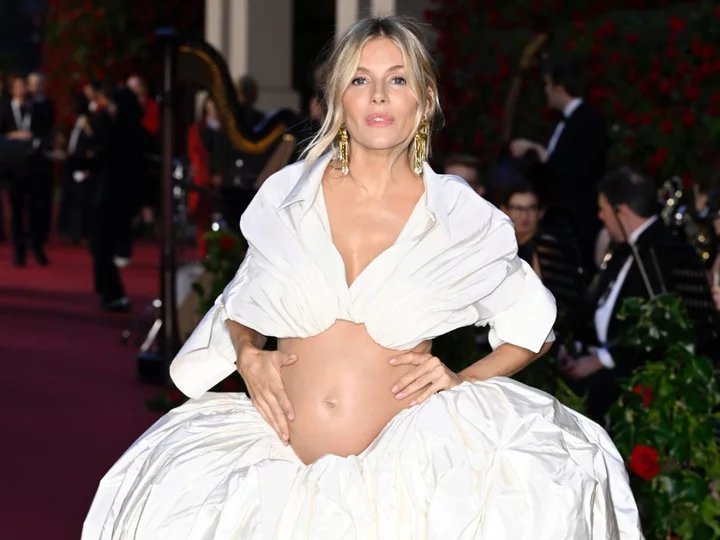
Celebrities mingle with royals at glam Vogue World party in London
Fashion icons joined Hollywood stars and British royalty to celebrate the first Vogue World event at London’s Theatre Royal Drury Lane on Thursday night (14 September). Billed as London’s answer to the Met Gala, the star-studded extravaganza was helmed by legendary American Vogue editor Anna Wintour, and featured a live performance overseen by Billy Elliot and The Crown director Stephen Daldry, as well as a dramatic catwalk show spotlighting British labels on the eve of London Fashion Week. The “multi-act celebration of the British performing arts” aimed to raise money for a variety of arts institutions including the Royal Ballet, the National Theatre and the Royal Opera House. Sienna Miller was among the stars to walk the red carpet outside the Theatre Royal, wearing a striking ivory two-piece by Schiaparelli couture which showed off her baby bump. It was revealed last month that the 41-year-old actor, who is already mother to 10-year-old daughter Marlowe, is expecting her second child. The Anatomy of a Scandal star later swapped the ensemble, which consisted of a crop top and puff-ball skirt, for a red tartan set when she took to the stage alongside fellow actors including Damian Lewis, Cush Jumbo, James Corden and James McAvoy. Princess Eugenie was also photographed on the red carpet wearing a green gown by Fendi, marking her first public appearance since welcoming her second child, a son named Ernest, in May. Her older sister Princess Beatrice opted for a floral dress by London-based designer Richard Quinn. This choice of gown choice surely had special significance for the royal: in 2018, Quinn received the inaugural Queen Elizabeth II Award for British Design from the princesses’ late grandmother, who also attended one of his London Fashion Week catwalk shows that year. The dress code for the event was “opening night”, with invitations featuring a West End stage enveloped in dramatic red curtains. Many of the stars in attendance pushed fashion boundaries on the red carpet, with Queen & Slim actor Jodie Turner-Smith wearing a revealing Viktor & Rolf creation made up of a statement satin bow, opera gloves and matching underwear. Bridgerton star Nicola Coughlan added some drama to proceedings with an eye-catching black and gold headpiece, paired with a black off-the-shoulder gown by designer of the moment Harris Reed , who unveiled his latest collection on Wednesday night (13 September). Simone Ashley, Coughlan’s co-star on Netflix’s hit Regency romance, opted for bejewelled net couture dress by Tamara Ralph with a white bodysuit underneath, while presenter and model Alexa Chung wore a Sixties-inspired two-piece from Nicklas Skovgaard, made up of shorts and a crop top, finishing off the look with a matching feather headpiece. I May Destroy You writer and actress Michaela Coel opted for a structured leather-look blazer, seemingly tapping into the trend for wearing knickers as outerwear, first seen on the Miu Miu catwalk in March. Crazy Rich Asians star Gemma Chan sparkled in a dark silver Louis Vuitton strapless dress, with her hair in a sleek updo and a red lip, while Kate Winslet kep things low-key in a slouchy cream suit with a beige underwear-style top underneath. Model Poppy Delevingne, designer Stella McCartney and Promising Young Woman actress Carey Mulligan posed together on the red carpet, with Delevingne’s pink dress providing a pop of colour amid McCartney and Mulligan’s understated black gowns. The blockbuster show opened with model Kate Moss walking across the stage, and closed with the appearance of four of the “original supers”: Naomi Campbell, Cindy Crawford, Linda Evangelista and Christy Turlington, who recently reunited to appear on the cover of Vogue . New Apple TV+ docuseries The Super Models, due to be released on 20 September, will alsochart their rise to global fame. The second annual event followed a New York edition held in 2022, and celebrated music, theatre and fashion at the beginning of London Fashion Week (September 15-19). It saw musical performances from FKA Twigs, Stormzy and Annie Lennox, along with a Shakespearean monologue from actress Sophie Okonedo. Fashion was front and centre, with models including Jourdan Dunn, Ashley Graham, Emily Ratajkowski and Cara Delevingne wearing creations from designer labels including Miu Miu, Alexander McQueen and more. Flying the flag for sustainable fashion were singer Rita Ora, model Twiggy and TikTok star Wisdom Kaye. All were wearing pre-loved fashion and accessories from eBay: Ora in a timeless black strapless dress, Twiggy in a red velvet suit and Kaye in wide-legged white trousers and a navy coat. Game Of Thrones star Maisie Williams wore experimental brand Maison Margiela, donning a black mini dress with a Peter Pan collar and cut-off sheer tights. Read More Everything we know about Vogue World, London’s answer to the Met Gala Sienna Miller is the face of M&S’s new autumn collection – and it’s sure to sell out Sienna Miller is having a baby with someone 15 years her junior – good for her Charity boss speaks out over ‘traumatic’ encounter with royal aide Ukraine war’s heaviest fight rages in east - follow live
2023-09-15 14:47
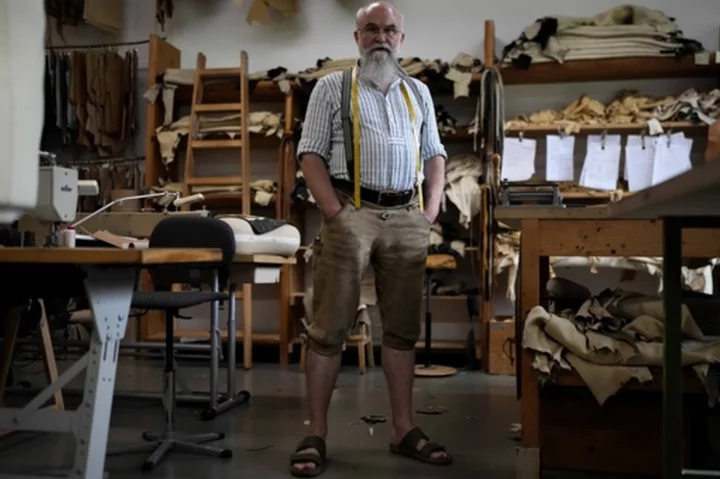
A German tailor who specializes in bespoke lederhosen is in high demand ahead of Oktoberfest
Germany’s city of Munich is getting ready to tap the kegs for Oktoberfest
2023-09-15 14:25

Japan’s Largest Cosmetics Firm Shiseido Bets on India Growth With First Launch in a Decade
Shiseido Co. is launching its first makeup brand in India in almost a decade, bringing popular line NARS
2023-09-15 13:50
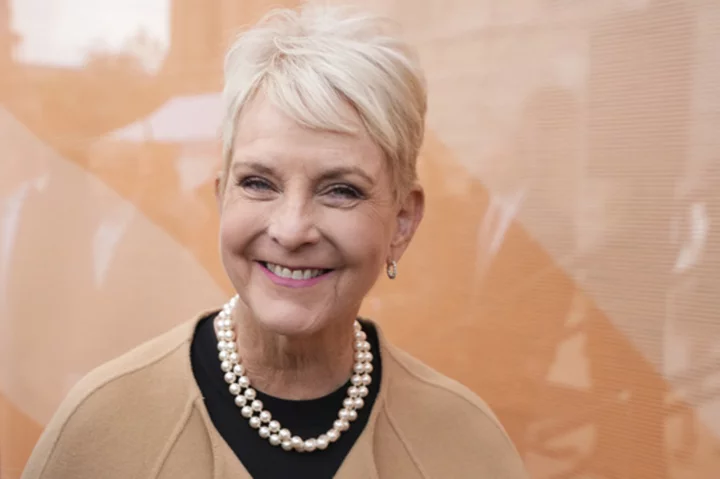
More than 700 million people don't know when — or if — they will eat again, UN food chief says
The head of the United Nations food agency says a global hunger crisis has left more than 700 million people not knowing when or if they will eat again
2023-09-15 13:49
